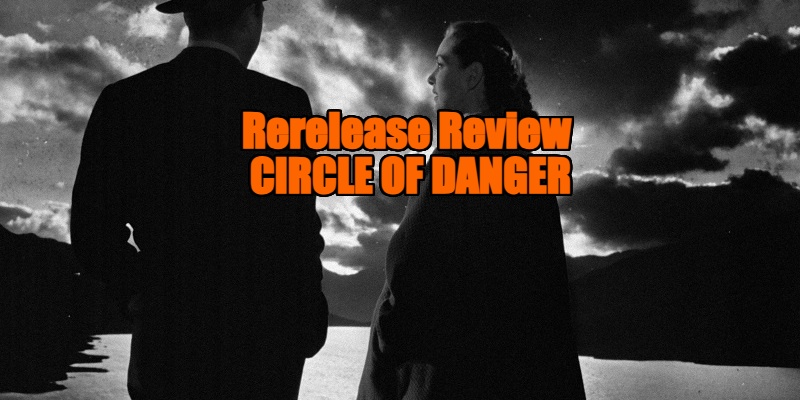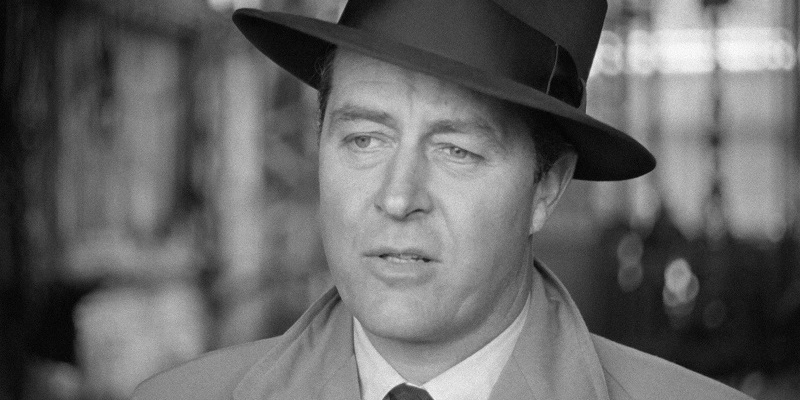
Review by
Eric Hillis
Directed by: Jacques Tourneur
Starring: Ray Milland, Patricia Roc, Marius Goring, Hugh Sinclair, Naunton Wayne

Horror fans rightly adore Jacques Tourneur for his collaborations
with producer Val Lewton and his 1957 masterpiece
Night of the Demon. In mainstream circles he's never quite gotten the respect he deserves,
despite working in a variety of genres. Perhaps it's that very versatility
that creates a misguided impression of Tourneur as a journeyman. If an
auteur is defined as a filmmaker whose work carries a distinctive theme,
then Tourneur fits the bill. There's a common theme in this director's work
of an outsider coming to a strange place, often clashing with the local
culture. Think of Simone Simon's Serb in New York in Cat People; the Americans in Haiti in I Walked with a Zombie; the European immigrants of his westerns. Like
Night of the Demon, Tourneur's 1951 thriller Circle of Danger features an
American who finds himself at the centre of a conspiracy while visiting the
UK.

The American is actually played by a Brit, Ray Milland, whose charisma
makes you overlook his unconvincing American accent within minutes of his
appearance. Milland's Clay Douglas has travelled to Britain seeking answers
regarding the mysterious death of his younger brother during a WWII commando
raid in which he was suspiciously the only casualty. Tracking down the
surviving members of his brother's unit, Clay hits a brick wall of silence.
Some of the men seem genuine in having no knowledge of the incident, while
others are sketchy, as though they're hiding something, particularly a
former commanding officer, Hamish (Hugh Sinclair).
On paper Circle of Danger reads like classic film noir, but
its tone and visuals are decidedly British. Clay's quest takes him the
length and breadth of Britain, covering the cities of England and the
villages of Scotland and Wales. Rather than shadowy alleys, the drama mostly
plays out in scenic rural locations. A tense climactic scene that sees Clay
become part of a sinister hunting party plays like a forerunner to
Straw Dogs, as does the hint of anti-American xenophobia that runs through the film,
with Clay's brother's former colleagues describing him as loud and
obnoxious.

Tourneur's producer here is Hitchcock's great collaborator
Joan Harrison, and the film often resembles something the master of
suspense might have made in his early British period. Scripted by
Philip McDonald, who honed his craft in the Charlie Chan and Mr. Moto
serials, Circle of Danger zips along at a breezy pace
reminiscent of The 39 Steps and
Young and Innocent. Many of the supporting characters Clay meets in his investigation are
distinctively British eccentrics. A scene in which Clay finds himself stuck
in a drawing room and forced to endure a bunch of kids' ear-splitting
musical recital is reminiscent of the birthday party sequence in
Young and Innocent. Naunton Wayne, best known as one half of
The Lady Vanishes' comic relief duo Charters and Caldicott, pops up in a scene-stealing role
as a former squaddie turned unscrupulous used car salesman. There's even a
villainous figure who lives with his mother.
Harrison's influence may also have extended to the film's female lead,
Elspeth, who finds herself romantically torn between Clay and Hamish. Played
adorably by Patricia Roc, Elspeth is surprisingly progressive for a
heroine of her era. Confronted by Hamish over her flirting with Clay, she's
unapologetic, and makes it abundantly clear that she is to be no man's
"property." So well developed is the romantic subplot, and so convincingly
played by Milland and Roc, that it threatens to overtake the central mystery
narrative. Clay's search for answers sees him stand up Elspeth at several
points, and there's a wonderfully written scene in which she expresses how
she needs to feel that she's as important to Clay as his late brother. By
the final act you'll find yourself willing Clay to put aside his stubborn
male pride, give up his investigation and focus on the very much alive woman
who adores him.

There's another surprise in the figure of Sholto Lewis, another of Clay's
brother's comrades now turned ballet choreographer. Played by
Marius Goring, the mincing Sholto intially comes off as a crude
homophobic stereotype, but the character serves to expose the prejudices and
preconceptions of both Clay and the audience. Clay initially laughs off the
idea that Sholto could have been a badass soldier, but as the film
progresses it becomes clear that Sholto is indeed a very dangerous man and
not the sort of person Clay should be trifling with.
If there's a flaw in Circle of Danger it's perhaps that the
movie never really lives up to its title until its final few minutes. Clay
never seems to be in any immediate danger until the climax. While it
resembles a Hitchcock movie in its Britishness, its wry humour and its
aching romance, it never has the suspense of a Hitchcock movie, as we're
never sure who exactly Clay should be wary of until the closing minutes. The
reason for much of this is explained however by a final twist that's as
melancholic as it is surprising. The movie ends on an upbeat note, but it
also leaves us contemplating the hidden scars and psychological trauma the
war left on a generation of men.

